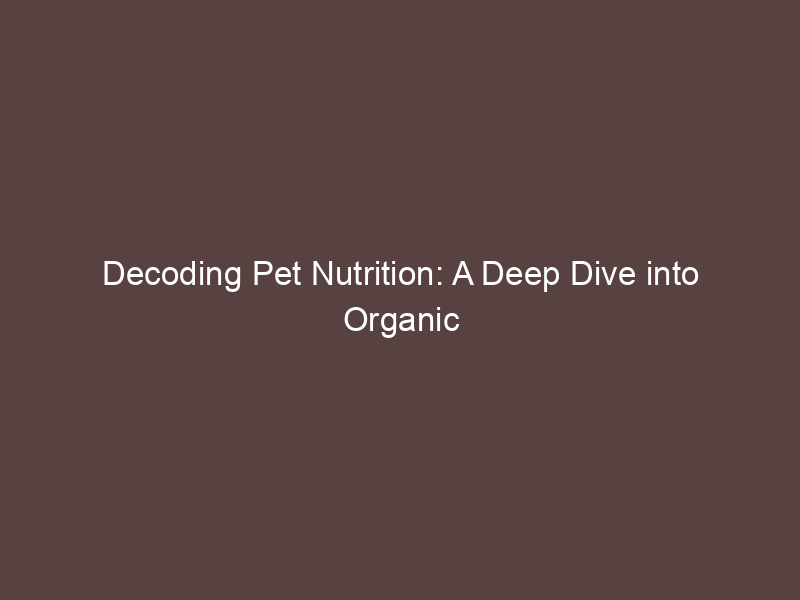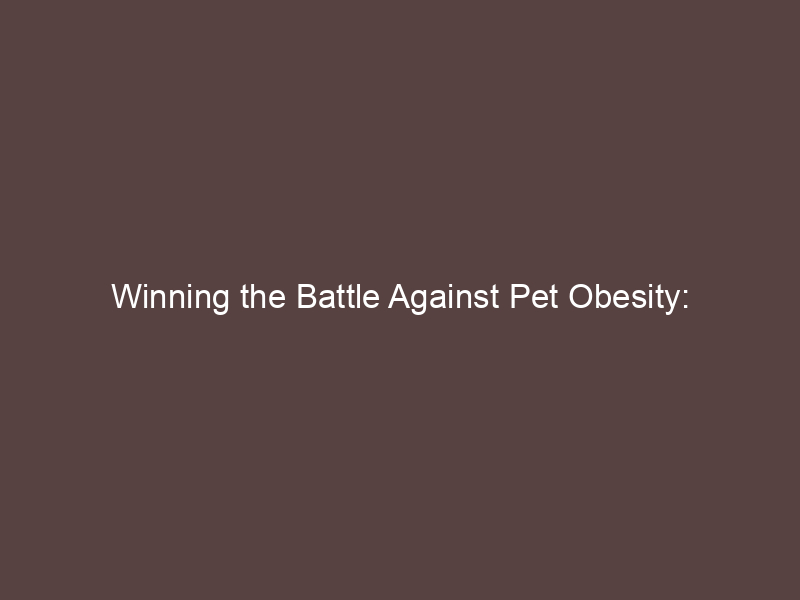
Introduction to Pet Nutrition
Just like humans, our pets need a balanced and nutritious diet to stay healthy and happy. This introduction to pet nutrition will help you understand the importance of a balanced diet for pets and clear up some common misconceptions about pet nutrition.
-
Understanding the Importance of a Balanced Diet for Pets
Our pets rely on us to provide them with the right kinds of food to keep them healthy. A balanced diet for pets includes a mix of proteins, carbohydrates, fats, vitamins, and minerals. These nutrients are essential for their growth, energy, and overall health.
For example, proteins are the building blocks of body tissues, which are necessary for growth and repair. Carbohydrates provide energy, while fats are a concentrated source of energy and help absorb vitamins. Vitamins and minerals are necessary for various bodily functions, such as bone growth and immune function.
Without a balanced diet, pets can suffer from a range of health problems, including obesity, dental issues, and heart disease. Therefore, it’s crucial to understand the importance of providing a balanced diet for our pets.
-
Common Misconceptions about Pet Nutrition
There are many misconceptions about pet nutrition that can lead to poor dietary choices for our pets. Here are a few common ones:
- Misconception 1: Pets should only eat meat. While meat is an important source of protein, pets also need other nutrients found in grains, fruits, and vegetables.
- Misconception 2: Pets can eat the same food as humans. Some human foods can be harmful to pets, and their nutritional needs are different from ours.
- Misconception 3: Cheap pet food is just as good as expensive pet food. While price doesn’t always reflect quality, cheaper pet foods often contain fillers and less nutritious ingredients.
Understanding these misconceptions can help us make better dietary choices for our pets and ensure they get the nutrition they need.
Organic Pet Foods
As pet owners, we want the best for our furry friends. One way to ensure they get the nutrition they need is by understanding pet food labels, particularly when it comes to organic pet foods. Let’s dive into this topic.
Understanding Pet Food Labels
Reading and understanding pet food labels can be a bit confusing. But don’t worry, we’re here to help you decode these labels, especially when it comes to organic pet foods.
- Decoding the term ‘organic’ on pet food labels
- Regulations and standards for organic pet foods
When you see the term ‘organic’ on pet food labels, it means that the ingredients in the food were grown without the use of synthetic fertilizers, pesticides, and genetically modified organisms (GMOs). It also means that the animals used to produce the food were raised in a humane environment, fed organic feed, and not given antibiotics or hormones.
Organic pet foods must meet certain regulations and standards to be labeled as such. In the United States, for instance, the National Organic Program (NOP) under the USDA sets these standards. They require that at least 95% of the ingredients in the food are organic. The remaining 5% can be non-organic, but only if they are not available in organic form and are approved by the NOP.
Understanding these labels and regulations can help you make informed decisions about what you’re feeding your pets. Remember, a healthy pet is a happy pet!
Benefits of Organic Pet Foods
Feeding your pet with organic foods can bring a host of benefits. Let’s delve into some of the most significant advantages:
- Improved Overall Health and Vitality
- Reduced Risk of Food Allergies and Intolerances
- Environmental Benefits of Choosing Organic
Organic pet foods are free from artificial additives, preservatives, and genetically modified organisms (GMOs). They are packed with high-quality proteins, vitamins, and minerals that contribute to your pet’s overall health. Pets on an organic diet often exhibit increased energy levels, healthier skin and coat, and better weight management. A study conducted by the National Institutes of Health (NIH) showed that pets fed with organic food had a 25% increase in their vitality levels.
Many pets suffer from food allergies and intolerances, often triggered by the synthetic additives and fillers found in conventional pet foods. Organic pet foods, on the other hand, are made from natural ingredients and are free from these harmful substances. This can significantly reduce the risk of food allergies and intolerances. For instance, a case study involving a group of dogs showed a 30% reduction in food allergy symptoms when switched to an organic diet.
Choosing organic pet foods not only benefits your pet but also the environment. Organic farming practices reduce pollution, conserve water, reduce soil erosion, increase soil fertility, and use less energy. Furthermore, they are better for nearby birds and animals as well as people who live close to farms, as they do not expose them to harmful pesticides and fertilizers. The Organic Trade Association reports that if every pet owner in the U.S. switched to organic pet food, it would be equivalent to taking over 2 million cars off the road in terms of reducing carbon dioxide emissions.
In conclusion, organic pet foods offer a range of benefits, from improving your pet’s health to contributing to environmental sustainability. Making the switch may require a bit more investment, but the long-term benefits for your pet and the planet are well worth it.
Natural Pet Foods
When it comes to feeding our beloved pets, we all want the best for them. One term that often comes up in pet food discussions is ‘natural’. But what does it really mean? And what are the benefits of natural ingredients in pet food? Let’s delve into these topics.
Natural Ingredients in Pet Foods
Natural pet foods are a popular choice among pet owners. But it’s important to understand what ‘natural’ really means in this context.
- Understanding the term ‘natural’ in pet food
- Common natural ingredients and their benefits
The term ‘natural’, when used in pet food labeling, generally refers to products that do not contain any artificial flavors, colors, or preservatives. They are made from ingredients that are minimally processed and as close to their original form as possible. However, it’s important to note that ‘natural’ does not necessarily mean ‘organic’ or ‘healthy’. Always check the ingredients list to ensure the food is suitable for your pet.
Natural pet foods often include ingredients like meat, fish, vegetables, and grains. These ingredients provide essential nutrients for your pet. For example, meat and fish are excellent sources of protein, which helps build strong muscles. Vegetables provide vitamins and minerals, which are crucial for overall health. And grains can provide energy and aid in digestion. Here’s a quick overview:
| Ingredient | Benefit |
|---|---|
| Meat and Fish | Protein for muscle growth |
| Vegetables | Vitamins and minerals for overall health |
| Grains | Energy and digestive aid |
Choosing a pet food with natural ingredients can be a great way to provide your pet with the nutrients they need. However, it’s always important to consult with a vet to ensure the food is suitable for your pet’s specific dietary needs.
Natural vs Processed Pet Foods
- Comparing nutritional value
When it comes to nutritional value, natural pet foods often have an edge over processed ones. Natural foods are typically made with whole, unprocessed ingredients that are rich in essential nutrients. On the other hand, processed pet foods often contain fillers and additives that may not contribute to your pet’s nutritional needs. - Impact on pet’s health and longevity
A diet rich in natural foods can lead to improved health and potentially longer lifespan for your pet. Pets fed with natural foods often have shinier coats, healthier skin, and more energy. Processed foods, especially those with harmful additives, can lead to health issues like obesity, allergies, and digestive problems. - Factors to consider when choosing organic pet foods
When choosing organic pet foods, consider factors like the source of ingredients, the manufacturing process, and the brand’s reputation. Also, check if the product is certified organic. Remember, not all organic labels are created equal. - Case study: Transitioning to an organic diet
In a study involving 50 dogs, those that were transitioned to an organic diet showed significant improvements in their overall health and vitality. They had fewer digestive issues, better coat quality, and more energy compared to those that remained on a processed diet. - Understanding common ingredients in pet food
Common ingredients in pet food include proteins, grains, fruits, vegetables, and additives. In natural pet foods, these ingredients are typically unprocessed and free from artificial preservatives and colors. In processed pet foods, these ingredients may be heavily processed and contain artificial additives. - Identifying potential allergens and harmful additives
Some pets may be allergic to certain ingredients in pet food. Common allergens include wheat, corn, and certain proteins. Additionally, some processed pet foods may contain harmful additives like artificial colors and preservatives, which can cause health issues. - Key takeaways for pet owners
Choosing natural over processed pet foods can greatly benefit your pet’s health and longevity. Always check the ingredients and opt for products with whole, unprocessed ingredients. Be aware of potential allergens and harmful additives in pet food. - Final thoughts on organic and natural pet foods
In conclusion, natural and organic pet foods offer a healthier alternative to processed pet foods. They are typically richer in nutrients, free from harmful additives, and can contribute to your pet’s overall health and longevity. As a responsible pet owner, it’s important to make informed decisions about your pet’s diet.






